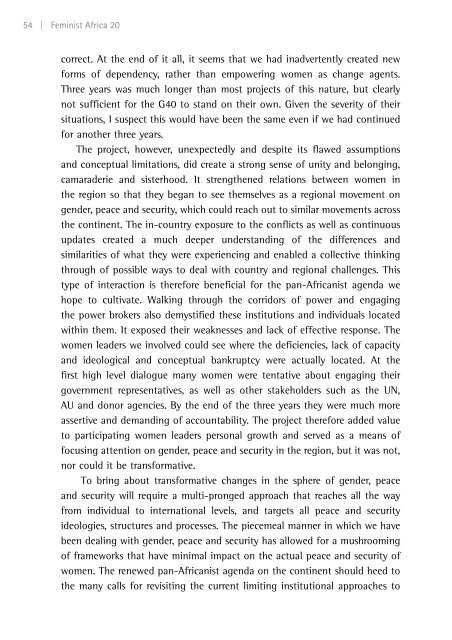You also want an ePaper? Increase the reach of your titles
YUMPU automatically turns print PDFs into web optimized ePapers that Google loves.
54 | Feminist Africa 20<br />
correct. At the end of it all, it seems that we had inadvertently created new<br />
forms of dependency, rather than empowering women as change agents.<br />
Three years was much longer than most projects of this nature, but clearly<br />
not sufficient for the G40 to st<strong>and</strong> on their own. Given the severity of their<br />
situations, I suspect this would have been the same even if we had continued<br />
for another three years.<br />
The project, however, unexpectedly <strong>and</strong> despite its flawed assumptions<br />
<strong>and</strong> conceptual limitations, did create a strong sense of unity <strong>and</strong> belonging,<br />
camaraderie <strong>and</strong> sisterhood. It strengthened relations between women in<br />
the region so that they began to see themselves as a regional movement on<br />
gender, peace <strong>and</strong> security, which could reach out to similar movements across<br />
the continent. The in-country exposure to the conflicts as well as continuous<br />
updates created a much deeper underst<strong>and</strong>ing of the differences <strong>and</strong><br />
similarities of what they were experiencing <strong>and</strong> enabled a collective thinking<br />
through of possible ways to deal with country <strong>and</strong> regional challenges. This<br />
type of interaction is therefore beneficial for the pan-Africanist agenda we<br />
hope to cultivate. Walking through the corridors of power <strong>and</strong> engaging<br />
the power brokers also demystified these institutions <strong>and</strong> individuals located<br />
within them. It exposed their weaknesses <strong>and</strong> lack of effective response. The<br />
women leaders we involved could see where the deficiencies, lack of capacity<br />
<strong>and</strong> ideological <strong>and</strong> conceptual bankruptcy were actually located. At the<br />
first high level dialogue many women were tentative about engaging their<br />
government representatives, as well as other stakeholders such as the UN,<br />
AU <strong>and</strong> donor agencies. By the end of the three years they were much more<br />
assertive <strong>and</strong> dem<strong>and</strong>ing of accountability. The project therefore added value<br />
to participating women leaders personal growth <strong>and</strong> served as a means of<br />
focusing attention on gender, peace <strong>and</strong> security in the region, but it was not,<br />
nor could it be transformative.<br />
To bring about transformative changes in the sphere of gender, peace<br />
<strong>and</strong> security will require a multi-pronged approach that reaches all the way<br />
from individual to international levels, <strong>and</strong> targets all peace <strong>and</strong> security<br />
ideologies, structures <strong>and</strong> processes. The piecemeal manner in which we have<br />
been dealing with gender, peace <strong>and</strong> security has allowed for a mushrooming<br />
of frameworks that have minimal impact on the actual peace <strong>and</strong> security of<br />
women. The renewed pan-Africanist agenda on the continent should heed to<br />
the many calls for revisiting the current limiting institutional approaches to


